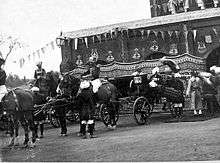Jammu–Sialkot line

Photo courtesy of searchkashmir.org

The Jammu–Sialkot line was a 43 km (27 mi) narrow gauge[1] branch of the North Western State Railway from Wazirabad Junction, Punjab, to Jammu through Sialkot Junction.[2] It was built in 1897, and was the first railway line in the state of Jammu and Kashmir.[3] Whilst once a crucial transportation route used for trade and commerce, particularly in the sugar trade, it was abandoned after the partition of India,[4][5] with a replacement line built from Pathankot to Jammu.[5]
Stations served
The train passed through the towns of Meeran Sahib, Ranbir Singh Pora, and Suchetgarh. The train from Sialkot Junction would depart at 8am, and the train from Jammu would depart at 11am.[4][5]
Post partition
The line has fallen into a state of disrepair on both sides of the border.[4][5] On the Pakistani side, the line is in working condition up to Sialkot Cantonment station only. The line has almost entirely disappeared on the Indian side. At Ranbir Singh Pora, refugees from Poonch state had settled on the land of the line, and established a settlement named "Patri". The state government once planned to declare the railway station in RS Pora as a heritage site, however, the plan was never executed. No interest in the line has been expressed by archaeological authorities or the Northern Railway division.[5]
In 2000, much of the old Jammu railway station was demolished to make way for an art centre.[6]
Potential revival
The train line is a source of nostalgia for many of the elderly on both sides of the border. It has been suggested that the route be reopened for trade between India and Pakistan. The writer of Pakistan's first national anthem, Jagan Nath Azad, a Hindu, was forced to leave Lahore due to the escalating violence between Hindus and Muslims. In July 2001, the Agra summit was convened to resolve long-standing issues between Pakistan and India. This gave Azad hope that, as a result of the summit, he would be able to "take the Sialkote-Jammu train route to reach my home town and sing the lines of the national anthem, the one I had composed".[4] Ultimately, the summit failed to produce any tangible outcome.[7] A detailed survey in December 2013 by Pakistan Railways showed that the line is unusable and would require billions of rupees to repair.[8]
References
- ↑ Jammu-Sialkot handshake Daily Excelsior
- ↑ SIALKOTE, 1911 Encyclopædia Britannica
- ↑ Jammu Town – Imperial Gazetteer of India, vol. 14, p. 49.
- 1 2 3 4 Train to Sialkot: Nostalgia dies hard for some Jammu veterans – Pradeep Dutta. Indian Express"'
- 1 2 3 4 5 Historic Jammu-Sialkot rail line in oblivion- Greater Kashmir
- ↑ Last remnants of Jammu-Sialkot rail link erased. 7 Jan 2013. GreaterKashmir.com
- ↑ Pakistan’s Changing Outlook on Kashmir -SYED RIFAAT HUSSAIN
- ↑ Gate-less rail crossings pose a threat to lives in Sialkot